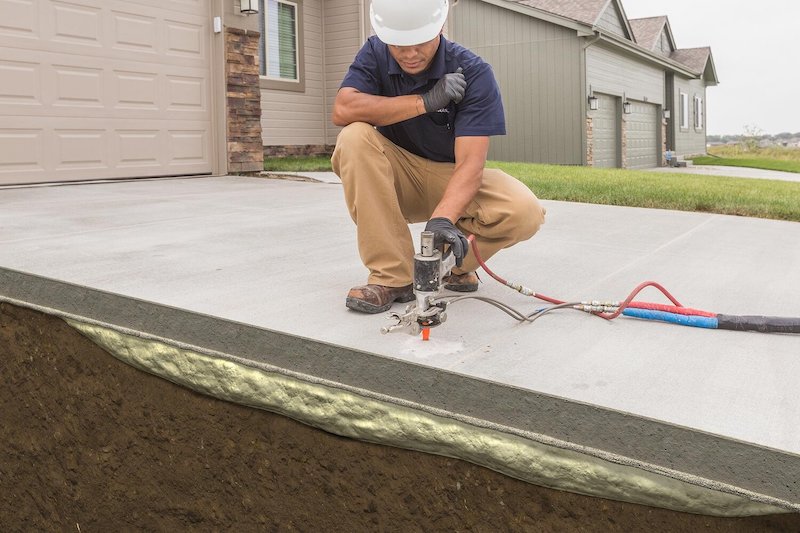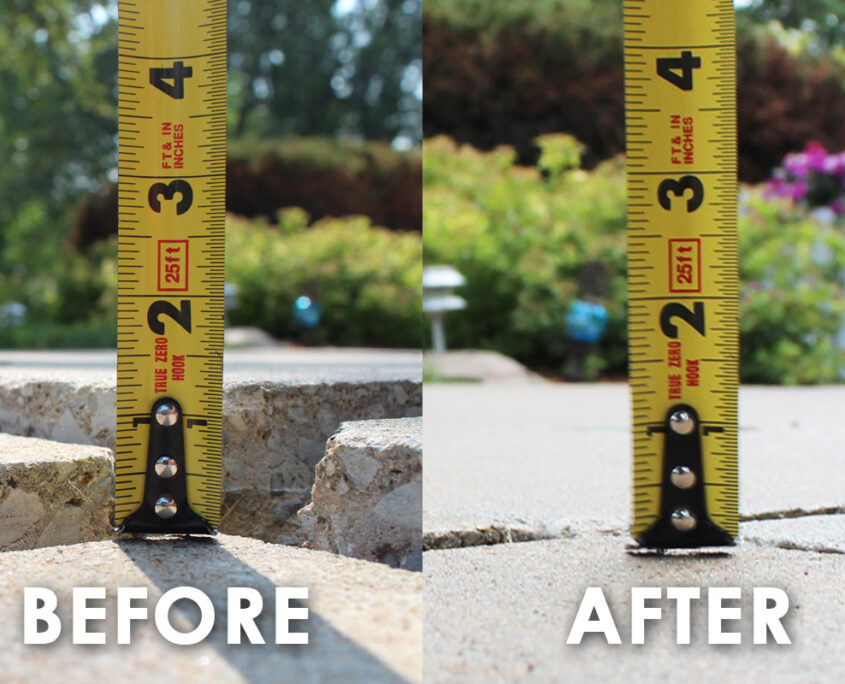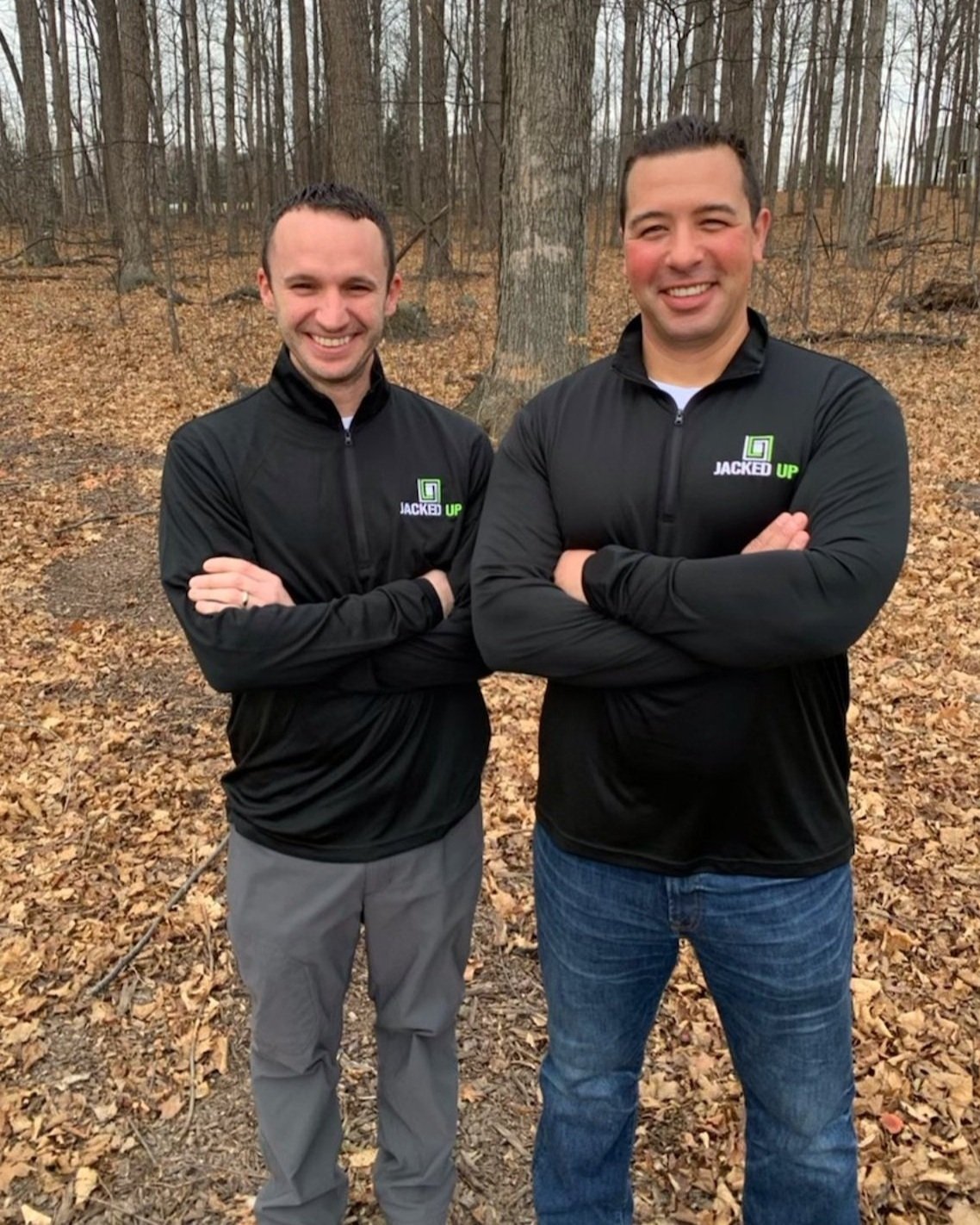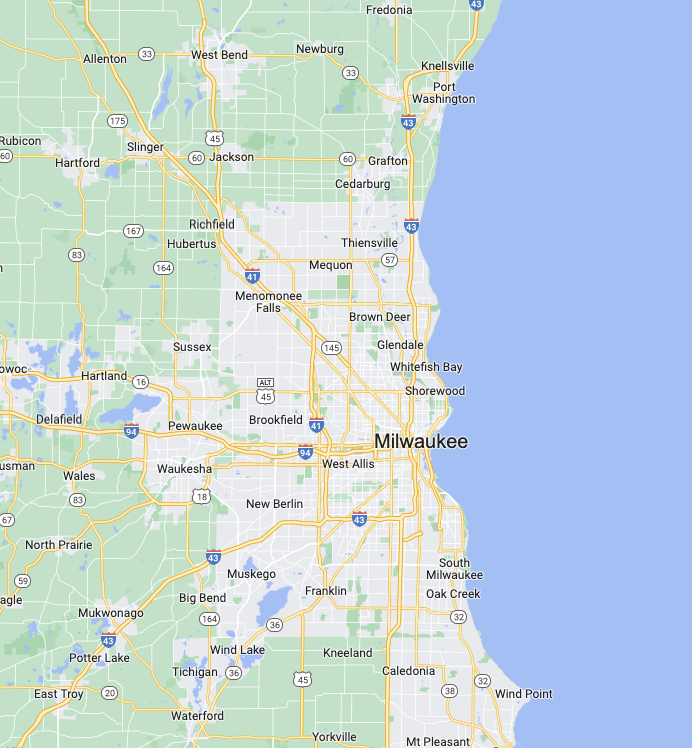 If you live in Brookfield or surrounding cities, and need your concrete leveled, then you’ve come to the right place. We fix driveways, walkways, porches, patios, and just about any other kind of concrete.
If you live in Brookfield or surrounding cities, and need your concrete leveled, then you’ve come to the right place. We fix driveways, walkways, porches, patios, and just about any other kind of concrete.
Give us a call today or email with your address for your free quote.
Brookfield Concrete Leveling FAQ’s
- What types of concrete applications can foam leveling repair?
Polyurethane concrete leveling is suitable for a variety of applications, including leveling sinking or uneven sidewalks, walkways, driveways, patios, porches, and pool decks. Additionally, commercial concrete leveling can be used to repair settling foundations, warehouse floors, pole barns, parking lots, loading docks, concrete sport courts, industrial storage or gas tank slabs, garage floors, industrial floors, break walls/sea walls, and more. Polyurethane concrete leveling is also suitable for interior applications such as uneven concrete slabs and basement floors.
- What are the advantages of polyurethane concrete leveling?
Polyurethane concrete leveling provides several advantages. It is a cost-effective solution that can be used to level uneven or damaged concrete surfaces quickly and easily. Polyurethane concrete leveling is highly flexible and durable, making it suitable for use in both interior and exterior applications. Additionally, the material bonds strongly with existing substrate surfaces, resulting in a seamless, uniform finish. Polyurethane concrete leveling is also resistant to cracking, shrinking and staining and can be applied quickly with minimal mess or disruption. Finally, it is an environmentally friendly option as it does not contain any volatile organic compounds.
- How much does concrete leveling cost?
Our minimum fee is $675.
- Is there any preparation required before installing polyurethane concrete leveling?
No there’s nothing you need to do beforehand.
- Is there a minimum amount of time needed for the material to cure after installation?
Generally speaking you can use your concrete immediately after we are done with the leveling project.
- How long does polyurethane concrete leveling last?
Polyurethane concrete leveling is designed to last for many years, providing a durable and long-lasting solution. In most cases, it can be expected to last 15-20 years or more with proper maintenance.
- How quickly can polyurethane concrete leveling be completed?
Polyurethane concrete leveling projects can generally be completed in a matter of hours, depending on the size and scope of the project. The material is applied quickly and easily with minimal mess or disruption, allowing the project to be completed quickly and efficiently.
- Do I need to be home during the project?
If the project is inside your home or garage, we will need someone available to let us inside the property. However, for exterior jobs, no one needs to be home.
- Why does concrete sink or become unlevel?
Concrete can sink or become unlevel due to a variety of reasons, including soil erosion and settling, inadequate compaction of the soil beneath the slab during construction, poor drainage around the slab, and/or too much weight placed on the surface. Additionally, it is common for concrete surfaces to settle over time as they are subject to extreme temperature fluctuations and the effects of moisture, which can weaken the soil beneath the slab.
- Are there any environmental concerns associated with the installation and disposal of polyurethane concrete leveling?
Polyurethane concrete leveling is an environmentally friendly option as it does not contain any volatile organic compounds. Additionally, no special handling or disposal requirements are necessary and the material can be disposed of in regular landfill sites. As such, there are no environmental concerns associated with the installation or disposal of this poly foam.
- Why is poly foam leveling a better solution than mudjacking?
Poly foam leveling is considered a better solution than mudjacking for several reasons. First, polyurethane foam can be applied much more quickly than mudjacking and requires less labor. Additionally, poly foam is resistant to cracking and shrinking, whereas mudjacking may crack in cold temperatures or over time due to the weight of the material used. Finally, poly foam is more affordable than mudjacking and can provide a better long-term solution to sinking or unlevel concrete surfaces.
- Do you offer virtual estimates?
Yes, this can be arranged. Reach out to us to either send photos or schedule a video chat via phone
- How does concrete leveling work?
Polyurethane concrete leveling works by injecting a special polyurethane foam underneath the sunken or unleveled concrete slab. This foam expands to fill any voids beneath the slab and lift it into place, filling in any gaps between the soil and the slab while providing a stable and even surface. The material also helps to stabilize the soil beneath the slab, preventing further settling or sinking in the future. Once it has cured, the foam is almost completely unnoticeable and provides a durable solution that can last for years.
-
 How will my concrete look afterward? Do you leave lots of ugly holes?
How will my concrete look afterward? Do you leave lots of ugly holes?
The injection holes we drill are only about the size of a penny, so they will be almost unnoticeable. The concrete should look like it has been leveled and restored to its original condition after we are done with the project. We also do our best to fill the holes with a color that matches your existing concrete. So if you have stamped or colored concrete, there will be no visible difference after the leveling project is complete.
- Why should I choose concrete leveling over concrete replacement?
Concrete leveling is a faster, cheaper, and more efficient option compared to concrete replacement. It can also be done with minimal disruption to your property, as the process involves drilling small injection holes and then injecting the polyurethane foam underneath the slab. This is much less intrusive than tearing out the existing slab and replacing it with new concrete. Additionally, leveling can provide a more durable solution than replacement, as it is designed to help prevent sinking or settling in the future. In short, concrete leveling is often the best choice when dealing with sunken or unleveled concrete surfaces.
- What is void filling?
Void filling is a process that involves injecting a material such as polyurethane foam into an area beneath a concrete slab in order to fill any gaps or voids. This helps to stabilize the soil beneath the slab and can help prevent further settling or sinking in the future. It is often used in conjunction with concrete leveling projects, as it can help to provide a more durable and long-lasting solution. Void filling is also much quicker and less disruptive than traditional concrete replacement as it requires minimal excavation or labor.
- Does lifting concrete with foam really work?
Yes, polyurethane foam is a very effective way to lift and level sunken or unleveled concrete. The foam expands as it is injected beneath the slab, filling in any gaps between the soil and the slab while providing a stable and even surface. This process can help to stabilize the soil beneath the slab, preventing further settling or sinking in the future. Once it has cured, the foam is almost completely unnoticeable and provides a durable solution that can last for years. Polyurethane foam is an effective and affordable way to address concrete leveling issues.
- I’ve heard of concrete leveling, but what other names does it go by?
Concrete leveling is also commonly referred to as concrete lifting, concrete raising, foam lifting, slab jacking, and mudjacking. All of these terms refer to the same process, which involves injecting a material such as polyurethane foam beneath the sunken or unleveled concrete in order to lift it back into place. This process is often used in conjunction with void filling, in order to provide a more durable and long-lasting solution. The terms are often used interchangeably, although they technically refer to slightly different processes.
-

Owners | Dylan & Adam | JackedUp
What is the difference between concrete leveling and void filling?
The main difference between concrete leveling and void filling is that concrete leveling involves actually lifting the sunken or unleveled concrete back into place, while void filling is used to fill gaps beneath the concrete in order to help stabilize and prevent further settling or sinking. Concrete leveling is typically done with polyurethane foam, which expands as it cures and helps to lift the slab up. Void filling can also be done with polyurethane foam, but its purpose is to fill gaps and provide a solid foundation for the concrete slab. In some cases, both processes may be used in order to ensure the most efficient and durable solution.
- Is concrete leveling permanent?
Concrete leveling can provide a durable and long-lasting solution, as it helps to stabilize the soil beneath the slab and prevent further settling or sinking. However, it is important to note that concrete leveling is not a fully permanent solution, as it can be affected by environmental factors such as soil erosion and shifting ground due to changes in temperature. Additionally, if the cause of the initial sinking is not addressed (e.g., poor drainage), then the problem may reoccur. With proper maintenance and periodic inspections, concrete leveling can provide a durable and long-lasting solution.
- What is soil stabilization?
Soil stabilization is a process that involves injecting a material such as polyurethane foam into the soil beneath a concrete slab in order to stabilize it. This helps to prevent further settling or sinking of the slab, and can also help to provide an even surface for the slab so that it does not become uneven over time. Soil stabilization is often used in conjunction with concrete leveling and void filling, as it helps to provide a more durable and long-lasting solution. With proper maintenance and periodic inspections, soil stabilization can help to ensure that the concrete slab remains stable for many years.
- Can I do concrete leveling myself or should I hire someone?
Concrete leveling is a process that should be done by a professional who has experience with the procedure. Not only can they ensure that the job is done properly and safely, but they also have access to specialized tools and equipment that may not be available to homeowners. Additionally, to reduce the risk of damage to the slab, an experienced professional must perform a thorough evaluation of the area before beginning work. For these reasons, it is generally recommended that homeowners hire a concrete leveling specialist for any job involving concrete lifting.
- Why do I need my concrete leveled?
Concrete leveling is necessary when a slab has sunken or become unleveled, either due to poor soil conditions and drainage or due to shifting ground due to environmental factors such as temperature changes. This can cause the concrete slab to become uneven over time, leading to problems such as cracking, buckling, and puddling. Concrete leveling can help to stabilize the soil beneath the slab and prevent further settling or sinking, while also providing an even surface for the concrete. This helps to ensure that the slab remains in good condition and provides a safe and durable surface for many years to come. Concrete leveling also helps prevent tripping hazards, and also reduces water from seeping into your home or property.
- What cities do you serve?
We provide concrete leveling in Brookfield, Elm Grove, and most of SE Wisconsin.
- What types of things can concrete leveling NOT fix?
Concrete leveling cannot fix issues such as cracks or crumbling concrete, nor can it repair damage caused by water intrusion. Also if heaving is caused by tree roots or other external sources, concrete leveling may not be effective. Additionally we can not level asphalt or pavers.
- Do you also offer concrete replacement or new concrete?
No, we do not offer concrete replacement services. We specialize in concrete leveling and related services, such as void filling and soil stabilization. For any repairs to existing concrete or for new concrete installation, you will need to contact a different contractor.
- Are there any risks associated with concrete leveling?
Yes, there are some risks associated with concrete leveling. If the job is not performed correctly, there is a risk of damaging the concrete slab or causing further settling or sinking. Therefore, it is important to hire an experienced professional who can assess the area and use appropriate methods and materials for soil stabilization. Additionally, if void filling material is used in soil beneath a slab that has already settled, there is a potential risk of further settlement or sinking.


 If you live in Brookfield or surrounding cities, and need your concrete leveled, then you’ve come to the right place. We fix driveways, walkways, porches, patios, and just about any other kind of concrete.
If you live in Brookfield or surrounding cities, and need your concrete leveled, then you’ve come to the right place. We fix driveways, walkways, porches, patios, and just about any other kind of concrete. 

